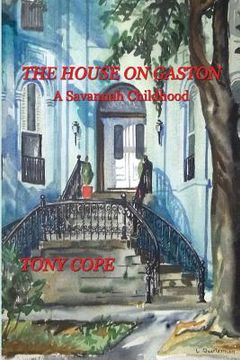Reseña del libro "The House on Gaston: A Savannah Childhood (en Inglés)"
It would be difficult for a child in America today to identify with the life of someone of the same age growing up during and just after World War II. Those were different times; some would say simpler times. Simpler? Maybe...in some ways. They were definitely exciting times for those of us who as children experienced them. The whole world was at war and yet there were no imbedded reporters and camera people who brought the horror of it all into our living rooms each night. There were reporters who did their best to bring us the details on the radio, in the newspapers and the news reels at the movies, but it all came out somewhat sanitized in black and white. Rarely were photos of dead bodies shown and without color, blood on a soldier looked more like dirt. So unless a family member or close family friend was killed or wounded, we were in effect insulated from the real tragedy of war. Our imaginations weren't insulated and we played at war, sometimes with toy soldiers, but often acting out battles ourselves with toy guns. Unlike games of cowboys and Indians where there was always somebody who wanted to be an Indian, nobody wanted to be a German or a Japanese. Even the war related activities like rationing, blackouts and scrap drives, which were problems for our parents, were part of the excitement for us. But it wasn't just the war that made those times different. There was no television, no computers and all that they have generated, no computer games, no Wii, no Ipods, Blackberries or any other hand held methods of communicating or entertaining ourselves. We did aspire to one day have a Dick Tracy two-way wrist radio, but contented ourselves with a secret decoder ring from a box of Wheaties. There were exciting toys that could be purchased, but we made many of our toys and constructed secret hideouts in our back yards and nearby parks. And we played ball; baseball, football and basketball...every free minute...and we played them in season. We'd have never played football during baseball season. With no television, it was the radio, the movies and comic books. With the mysteries, adventure stories and comedies on radio we saw with our imaginations and no movie or television set designer has ever been able to compete with a child's imagination. There was also the regional distinction...growing up in the Deep South with all of the customs and morays that that entailed. A lot of what we as children did in Savannah, Georgia was similar to what was going on in other parts of the country, but there were differences. We didn't play ice hockey, we didn't eat fish for breakfast and children in other areas didn't eat grits. Maybe the biggest difference was that the friends that I played with, listened to the radio with, went to school with were white, not just by custom, but by law. We probably played similar games, pulled for the same teams and listened to a lot of the same music as African-American children, but we never did any of those things together. That's a shame, but in the 1940s it was a fact of life in the South. Children of each generation probably think that they are living in the best of times. I am no different. Looking back so many years, it's easy to remember just the good times, but for me the 1940s and early 50s were the best years and The House on Gaston was, for the author, the most wonderful place to experience them.

